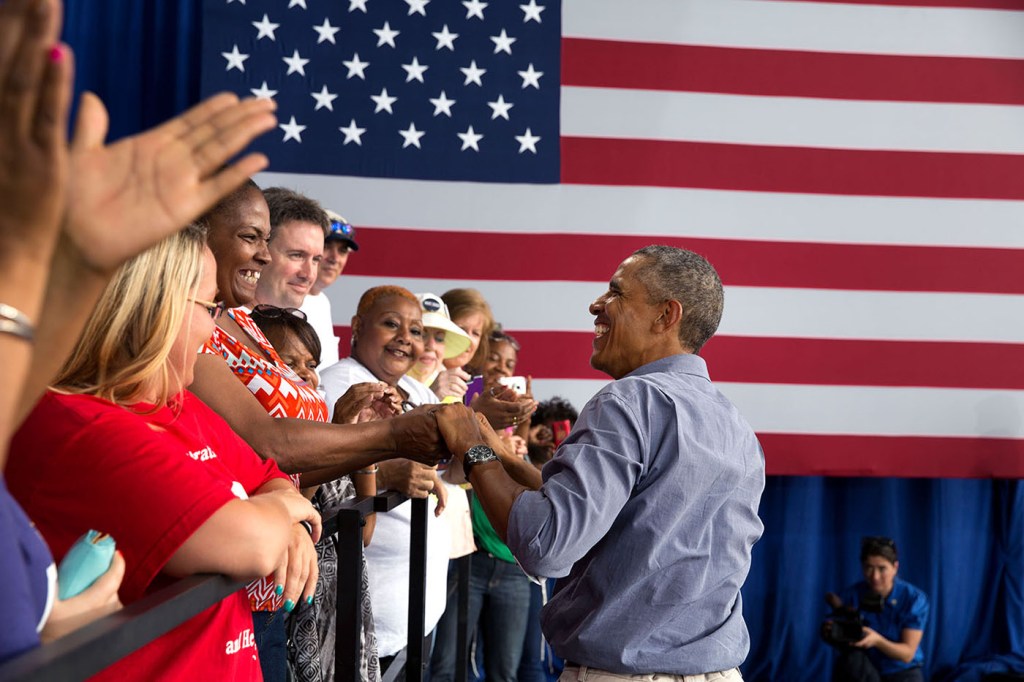What President Obama’s legacy will look like

President Barack Obama will deliver his farewell address on Tuesday night in Chicago, giving him one final opportunity to defend his legacy before Donald Trump is sworn into office.
We asked four Northeastern University faculty members to reflect on how Obama will be remembered, with a particular focus on his impact on healthcare, human rights, and American culture.
‘Obama had the ability to sense people’s pain’
Richard O’Bryant will remember Obama for his empathy and compassion, particularly in the face of national tragedies like the South Carolina church massacre and the Sandy Hook Elementary School shooting.
“He had the ability to sense people’s pain when difficult situations arose,” says O’Bryant, the director of the John D. O’Bryant African American Institute. “He could tap into what people were feeling.”
In his view, Trump’s behavior as president-elect has further elevated Obama’s reputation as commander in chief. When comparing the two, he says, Obama clearly exhibits a stronger understanding of complex issues while acting more “presidential.”
“The country is going to miss Obama,” O’Bryant says. “For all of his faults, he never once embarrassed the country.”
According to O’Bryant, Obama’s effect on the African American community will be felt for a long time. While some black people were disappointed in his work as a president, he says, most found him to be a caring and thoughtful person.
“The African American community is proud of the job Obama did under some very difficult circumstances and with incredible opposition,” O’Bryant explains. “He resisted the temptation to place blame on others and continued to push forward to find solutions to tough problems.”
Obama’s healthcare legacy ‘will be tested’ by Trump administration
Whether Obama’s signature healthcare law is remembered as his most notable achievement or his biggest disappointment will depend on the outcome of Trump’s effort to repeal and replace “Obamacare,” according to healthy policy expert Timothy Hoff.
“At the time of passage, the Affordable Care Act was thought by many to be as significant a piece of domestic policy legislation as any of the past several decades,” says Hoff, professor of management, healthcare systems, and health policy in the D’Amore-McKim School of Business. “In getting the ACA passed, Obama was able to create through law what no president before him could—the ability for all American citizens to have a viable opportunity to gain meaningful healthcare coverage.”
But the political compromises struck to get the law passed in Obama’s first year in office—as well as the Republican Party’s continued opposition to “Obamacare” since then—has helped to fuel a negative perception of the ACA among about half of the American public.
Now, says Hoff, “The president’s lasting legacy with respect to achieving meaningful health reform will be tested in coming year as Trump and the Republican Congress seek to repeal and replace all or part of the ACA.”

Obama, in the Oval Office in March 2016, talks on the phone with NASA astronaut Commander Scott Kelly upon his return from a nearly yearlong mission on the International Space Station.
On human rights front, ‘not all of Obama’s hopes and aspirations were fully met’ but dialogue has been ‘active and robust’
“There was tremendous hope and excitement in the human rights community when Obama was elected,” says law professor and human rights scholar Martha Davis, who noted that he delivered a stirring statement to commemorate International Human Rights Day just weeks before he was inaugurated in January of 2009 as the 44th president of the United States. “But as with so many aspects of his administration,” she notes, “not all of these hopes and aspirations were fully met.”
For example, Davis pointed to Obama’s failed pledge to close the Guantánamo Bay detention center, where dozens of prisoners are still being held in connection with the global war on terror. She also noted the Obama administration’s use of drones as an instrument of war, which has drawn condemnation from human rights advocates worldwide, and the nation’s failure to ratify the Convention on the Elimination of All Forms of Discrimination against Women, the world’s primary document on women’s equality.
On the other hand, the Obama administration did subject its human rights record to review by the U.N. Human Rights Council in 2010, marking the first time that the country’s human rights policies were examined by the Geneva-based body, which was created in 2007. “Many urged the United States to suspend the death penalty, with the ultimate goal of abolishing the practice, and to ratify international treaties aimed at protecting the rights of women and children,” The Washington Post reported at the time.
As Davis puts it today: “The dialogue between U.S. human rights advocates and the administration has been active and robust, and the administration deserves credit for fostering that dialogue.”
Obama ‘did not hesitate’ to exercise his presidential power
“Obama will be remembered as a president who did not hesitate to use boldly the powers of his office to achieve objectives he saw as important to the nation’s future,” says Robert Gilbert, professor emeritus of political science.
As commander in chief, he says, Obama sent U.S. forces into Pakistan to kill Osama bin Laden and ordered more than 500 drone strikes to kill terrorist leaders abroad. As “chief executive,” he appointed more than 100 women to lower federal court judgeships while tripling the number of female Supreme Court justices from one to three.
In other ways, Obama’s presidency has been less effective. His eight-year tenure in the White House failed to bring about an end to racial discord, and, according to Gilbert, might have even served to incite such enmity.
“The tea party movement was energized greatly by Obama’s 2008 election victory,” Gilbert explains. “For this alone, Obama will be remembered throughout history, especially since Trump—a leader of the birther movement who claimed until 2016 that Obama was not born in the U.S.—has been elected to succeed him.”
Beyond his record on the issues, Gilbert will forever remember Obama as gifted speaker with a talent for inspiring people through thoughtful turns of phrase. As he explains, “Obama will be remembered as a leader of impressive oratorical abilities who inspired millions of Americans by the force of his words and by his consistently restrained demeanor.”





